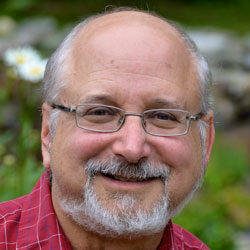Drawing on the Unconditional
Love and Wisdom
of Our Buddha Nature
A BCBS Path Program with John Makransky
May 24, 2024 - March 12, 2025
From a Tibetan Buddhist perspective, our buddha nature is the basic space of our being undivided from the vast capacities of awareness, warmth, love, compassion, and wisdom. These capacities are always available below our surface consciousness but often hidden by our habits of thought and reaction. One way Tibetan practitioners start to access them is by bringing to mind the Buddha as an enlightened field of refuge and experiencing themselves and their whole world as held in the Buddha’s unconditional love, compassion, and wisdom. Other contemplative traditions follow an analogous pattern: being held in the love, compassion, and wisdom of God, saints, prophets, or spiritual ancestors. This evokes the practitioners’ own corresponding qualities of appreciation, warmth, love, and openness. In Tibetan Buddhism, all such qualities are then drawn on in meditation to help the mind settle into the source of those qualities—the basic space, pure awareness, and vast capacity of our buddha nature, from which to recognize others in their deep nature and hold them in warmth and compassion. In this program, we will adapt this pattern of practice from Tibetan Buddhism, with some assistance from modern psychology, to make it accessible both for Buddhist practitioners and for people of all backgrounds and faiths who have contemplative experience and seek an accessible way to cultivate unconditional love and wisdom.
Program Overview
| Application Timeframe | Applications close January 15, 2024 |
|
| Prerequisite | Two years of contemplative experience in Buddhism or another spiritual tradition | |
| Duration | 9 months | |
| In-Person Course Dates | May 24-29, 2024 Nov. 8-13, 2024 March 7-12, 2025 |
|
 | Zoom Gatherings | Designated Wednesdays (7:30-9:00 PM ET) |
Program Overview
| Application Timeframe | Applications close January 15, 2024 |
|
| Prerequisite | Two years of contemplative experience in Buddhism or another spiritual tradition | |
| Duration | 9 months | |
| In-Person Course Dates | May 24-29, 2024 Nov. 8-13, 2024 March 7-12, 2025 |
|
 | Zoom Gatherings | Designated Wednesdays (7:30-9:00 PM ET) |
From a Tibetan Buddhist perspective, our buddha nature is the basic space of our being undivided from the vast capacities of awareness, warmth, love, compassion, and wisdom. These capacities are always available below our surface consciousness but often hidden by our habits of thought and reaction. One way Tibetan practitioners start to access them is by bringing to mind the Buddha as an enlightened field of refuge and experiencing themselves and their whole world as held in the Buddha’s unconditional love, compassion, and wisdom. Other contemplative traditions follow an analogous pattern: being held in the love, compassion, and wisdom of God, saints, prophets, or spiritual ancestors. This evokes the practitioners’ own corresponding qualities of appreciation, warmth, love, and openness. In Tibetan Buddhism, all such qualities are then drawn on in meditation to help the mind settle into the source of those qualities—the basic space, pure awareness, and vast capacity of our buddha nature, from which to recognize others in their deep nature and hold them in warmth and compassion. In this program, we will adapt this pattern of practice from Tibetan Buddhism, with some assistance from modern psychology, to make it accessible both for Buddhist practitioners and for people of all backgrounds and faiths who have contemplative experience and seek an accessible way to cultivate unconditional love and wisdom.
Program Notes
This nine-month Path program includes three in-person retreats and monthly online group discussions with John on Zoom. The texts for the program are the book Awakening through Love by John and the article “Sustainable Compassion Training” (in Frontiers in Psychology), co-authored by John and Paul Condon. In all retreats, teaching sessions led by John will include an explanation of key principles, guided meditations, Q and A, and discussion. Between teaching sessions, noble silence will be maintained.
Time Commitment Outside of the Program
Participants will develop a daily meditation practice based on what is introduced in the retreats in a way that fits into their lives. Attendance at retreats and monthly Zoom discussion sessions is expected. By showing up in these ways, we support each other in the practice of learning and deepening together.
Prerequisites
At least two years of contemplative experience in Buddhism or another spiritual tradition that involves the regular practice of some form of meditation, contemplation, and/or prayer. Please read the book Awakening through Love and the article “Sustainable Compassion Training” before attending the first retreat of this program. A handout of meditations will also be provided.
Requirements
Participation in the entirety of the path program.

Path Program and Schedule
Retreat I: Drawing on Innate Powers of Love and Wisdom from our Buddha Nature
May 24-29, 2024
In-Person Retreat
In the first retreat, we will learn three modes of practice that empower each other. The receptive mode helps us find access to unconditional qualities of love and wisdom from the depth of our awareness—our buddha nature. In the deepening mode, we let those qualities help the mind settle into the source of the qualities—the non-conceptual openness, simplicity, clarity, peace, and compassionate capacity of our buddha nature. In the inclusive mode, we come from that depth of being to recognize others in their depth and to include them all in those unconditional qualities of openness, love, and wisdom. This contemplative process also empowers our ability to discern the empty, constructed nature of our experiences, freeing the mind for further access to its innate awakening capacities.
Wednesday Zoom Gatherings
7:30-9:00 PM ET (4:30-6:00 PM PT)
2024: June 12, July 10, Aug. 7, Sept. 4, Oct. 2
In each ninety-minute session, we will practice one meditation followed by a group discussion. The discussion will be guided by concerns and questions raised by participants from their experience of the practices introduced in the retreats. What are we newly noticing in these practices? What further awakening qualities, senses of self, emotions, and reactions are becoming newly conscious to us? How do we take them into practice? What new questions or difficulties are emerging from all that? How are the practices freshly informing our lives, ways of being with others, and activities? What are these practices making newly possible?
Retreat II: Generating Sustainable Compassion as an Expression of Love and Wisdom
November 8-13, 2024
In-Person Retreat
The three modes of practice that we learned in the first retreat provide a foundation in this second retreat for generating a power of compassion that can embrace all sufferings of oneself and others in a deeply healing way without succumbing to empathic distress or compassion fatigue. We learn meditations for generating empathy and compassion designed to generate compassionate solidarity with all parts of ourselves and all other beings in a sustainable and inclusive way. This is supported by learning how to let love, compassion, and wisdom increasingly empower each other.
Wednesday Zoom Gatherings
7:30-9:00 PM ET (4:30-6:00 PM PT)
2024: Dec. 11
2025: Jan. 8, Feb. 12
In each ninety-minute session, we will practice one meditation followed by a group discussion. The discussion will be guided by concerns and questions raised by participants from their experience of the practices introduced in the retreats. What are we newly noticing in these practices? What further awakening qualities, senses of self, emotions, and reactions are becoming newly conscious to us? How do we take them into practice? What new questions or difficulties are emerging from all that? How are the practices freshly informing our lives, ways of being with others, and activities? What are these practices making newly possible?
Retreat III: Synergies of Love, Compassion, and Wisdom in Meditation and in Life
March 7-12, 2025
In-Person Retreat
The third retreat provides an opportunity to deepen further together in the practices introduced in the prior two retreats. We’ll explore how the unconditional qualities accessed in the receptive and inclusive modes of practice can help the mind (in deepening mode) settle more fully into its buddha nature of non-conceptual openness, clarity, peace, and vast capacity. We’ll explore how settling more fully into that deep nature, in turn, can free up its capacities of unconditional love and wisdom to further empower the first two modes. And we’ll explore how all three of these modes of practice provide a secure foundation to generate an increasing power of compassion that can embrace all sufferings of self and others with joy. We will also explore how ongoing familiarization with all these practices can inform our lives and ways of being with others in family life, work, relationship, and action.

Program Fees
Residential Pricing:
Includes Lodging and Meals at BCBS during the In-Person Retreats
| Supported | Mid Level | Sustaining | Benefactor |
| $1,935 | $2,535 | $3,135 | $4,335 |
Non-Residential Pricing:
Includes Meals without Lodging during the In-Person Retreats
| Standard | |||
| $1,200 |
Pricing Notes
- Program fees include all components.
- The first half is due upon registration, and the final half is due before the first retreat.
- Program fees do not include payments to the teacher.
- Participants are invited to support John Makransky through the practice of dāna (generosity).
- Financial assistance can be requested on the registration page.
Application Dates
| Applications Open: | September 12, 2023 |
| Applications Close: | January 15, 2024 |
| Initial Accepted Applicants Notified: | January 29, 2024 |
| Payment Due: | Two weeks from the date of acceptance |
| Program Starts: | May 24, 2024 |

John Makransky, Ph.D., is a professor of Buddhism and Comparative Theology at Boston College, senior advisor for Chokyi Nyima Rinpoche’s Centre of Buddhist Studies in Nepal, a fellow of the Mind and Life Institute, and developer of the Sustainable Compassion Training model for accessing innate capacities of compassion and awareness. John's scholarly writings have focused on connections between practices of devotion, compassion, and non-dual wisdom in Indo-Tibetan Buddhism, adapting Buddhist practices to meet contemporary minds, and theoretical issues in interfaith learning. In 2000, John was ordained as a Lama, a meditation teacher of innate compassion and wisdom, within the Nyingma Dzogchen tradition of Tibetan Buddhism. As a meditation teacher, John is known for guiding participants in discovering underlying powers of unconditional love and wisdom. For the past twenty-five years, John has taught meditations of innate compassion and wisdom, adapted from Tibetan Buddhism, for modern Buddhists, those in other spiritual traditions, and people in caring roles and professions.
